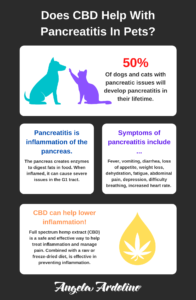Can CBD Help with Pancreatitis in Dogs?

When one organ is out of balance in your dog’s body, your dog’s overall health will decline. Nowhere is this more evident than in cases of pancreatitis. The pancreas is part of both the digestive and endocrine systems, and is needed for the digestion of food, production of enzymes, and creation of insulin. Needless to say, this organ is vital for a fully balanced body. But, dangerous side effects of prescription medications for pancreatitis may throw the body even further out of balance, which is why so many pet parents are turning to holistic treatments to ease their pup’s pancreatic problems.
Pancreatitis is a common, in fact nearly 50 percent of dogs and cats with pancreatic issues will develop pancreatitis in their lifetime. When left untreated, this can lead to serious illness, pain, and can even be fatal. However, recognizing the signs of pancreatitis early and starting with a holistic regimen can better your pet’s chances of living a long, healthy life and prevent future pancreatitis flare-ups.
WHAT IS PANCREATITIS?
The pancreas is the organ responsible for producing important enzymes that allow the body to absorb fats and other nutrients from food, and the pancreas is important in the process of digestion. When the pancreas becomes inflamed, it is called pancreatitis.

Normally, pancreatic enzymes are in an interactive state and travel to part of the small intestine, where they are activated to begin the digestion process. But, in cases of pancreatitis, the enzymes are released and activated prematurely and don’t reach their target. This results in the pancreas effectively digesting itself and surrounding organs. When the pancreas in inflamed, digestive enzymes can also escape into the abdominal cavity which causes damage to the pancreas, intestines, and other surrounding organs and tissue.
There are two types of pancreatitis in dogs: acute and chronic. Acute means that the symptoms present quickly, with no prior warning or build-up. Chronic means that the condition builds and worsens over a longer period of time. Both types can be extremely painful for your dog, but acute may be more noticeably painful because of the sudden onset. Within these two types, there are also two degrees of pancreatitis: mild and severe. Both acute and chronic pancreatitis can be mild or severe.
WHAT CAUSES PANCREATITIS? CAN MY DOG DIE FROM PANCREATITIS?
When left untreated, pancreatitis can be fatal. It can also cause severe organ damage and brain damage. However, pancreatitis can be prevented and with proper treatment, permanent organ damage can be avoided.
There are several causes of pancreatitis, including obesity, diabetes, hypothyroidism, hypocalcemia, bacterial or viral infections, gastric tract diseases, abdominal trauma, genetic disposition, toxins, prescription medications, scorpion stings, and ingestion of too many high-fat meals. Dogs who have epilepsy may also be at higher risk of pancreatitis. Small breeds like the miniature schnauzer, miniature poodle, and cocker spaniel are at higher risk of pancreatitis.
WHAT ARE THE SYMPTOMS OF PANCREATITIS?
The severity of symptoms depends on whether the case is mild or severe. These symptoms do not all have to be present, and include:
- Fever
- Vomiting
- Diarrhea
- Loss of appetite
- Weight loss
- Dehydration
- Fatigue and sluggishness
- Mild to severe abdominal pain
- Depression
- Increased heart rate
- Difficulty breathing
WHAT SHOULD I DO IF MY DOG HAS PANCREATITIS?
If you suspect that your dog has pancreatitis, you should take them to your holistic veterinarian right away. Because it is a very serious condition that often is mistaken for a different issue, you should be sure to ask your veterinarian to test for pancreatitis.
Your veterinarian may run a variety of tests and may first check for gallstones and reflux. An x-ray, radiograph, ultrasound, and blood work will be able to test for elevated enzymes and trauma to the pancreas and surrounding organs. The vet may also test insulin levels, because the pancreas can impact the production of insulin in the body.
Often a veterinarian will prescribe pain management options since there is no fast, easy way to fix the issue. They may want to do IV fluid therapy, medication to help prevent vomiting and dehydration, monitoring of fat intake, and anti-inflammatory medications. It should be noted that, as with any medication, there may be dangerous side-effects.
DOES CBD OIL HELP WITH PANCREATITIS? IS THERE RESEARCH TO SUPPORT CBD OIL FOR PANCREATITIS?
Full spectrum hemp extract (CBD) – known commonly as “CBD oil” – is a safe and effective way to treat inflammation and manage pain associated with pancreatitis. It is also effective in preventing inflammation from building up in healthy dogs.
In an 8-month, double-blind study conducted by Cornell University’s College of Veterinary Medicine, researchers found that dogs who were given CBD saw a significant decrease in pain and an increase in activity with no side effects.
A study published in 2006 in Current Neuropharmacology also states that CBD has therapeutic benefits for both people and pets suffering from chronic pain and acute chronic pain episodes because compounds found in cannabis reduce inflammation. In fact, the most abundant phytocannabinoid in cannabis, CBD, has strong anti-inflammatory properties, while CBC, CBG, and THCV have also demonstrated anti-inflammatory properties. Cannabinoids act as anti-inflammatory agents by inducing apoptosis, inhibiting of cell proliferation, suppressing cytokine production, and inducing T regulatory cells. Cannabinoids have also been demonstrated to promote the production of anti-inflammatory interleukins, while inhibiting the production of pro-inflammatory cytokines. What does that mean for your dog? Less inflammation and less pain.
Full spectrum hemp extract can also help treat nausea and GI pain associated with pancreatitis, and is often used to help regain appetite. Research published in Nutraceuticals in Veterinary Medicine states that hemp oil is a significant source of proteins and essential fatty acids, including gamma-linolenic acid (GLA). Of note: the same study found that CBD interacts with the endocannabinoid system in dogs to treat cancer, improve sleep, prevent obesity and metabolic diseases, resolve anxiety and stress, treat inflammatory conditions, improve pulmonary and cardiac conditions, and acts as a neuro-protectant.
HOW MUCH CBD SHOULD I GIVE MY DOG WITH PANCREATITIS?
How Do I Determine the Right Amount of CBD for My Dog?
When using a full spectrum hemp extract for wellness support, it’s important to tailor the amount to your dog’s individual needs. For dogs needing extra support for healthy inflammatory responses, many pet parents start with an amount between 9–18 mg of CBD daily, which may be equivalent to 1–2 mL depending on the concentration of the product.
Every dog’s body is different, so the optimal amount can vary. It’s best to begin with a lower amount and adjust gradually based on your dog’s response. Research suggests that CBD is well-tolerated in dogs, and there is no known risk of overdose. Always consult with your veterinarian before introducing new supplements into your pet’s routine.
WHAT ELSE CAN I DO TO PREVENT PANCREATITIS IN MY DOG?
One of the most important things to do to prevent or treat pancreatitis is to change the pet’s diet to raw or freeze-dried and get the gut health in check. I recommend using Solutions Pet Products, which is available in the refrigerated section of most pet stores. However, a raw diet does not have to be pre-packaged. You can feed your dog many of the foods that you already buy for yourself. For examples, dogs can eat sweet potatoes, eggs, and chicken or beef. You can learn more about how to feed raw by listening to my podcast, Your Natural Dog.
It is also important to get a healthy balance of prebiotics and digestive enzymes. I also recommend Glacier Peaks Holistics products to help your pet achieve overall well-being.
About Angela Ardolino

Angela Ardolino, a certified cannabis and fungi clinician, brings over 20 years of expertise to the field of holistic pet wellness. As a graduate of the inaugural Medical Cannabis for Therapeutic Use program at the University of Vermont School of Medicine, she is a passionate advocate for safe, natural, and ethically-grown whole plant and fungi medicine tailored for pets.
Committed to the highest standards, Angela continues to educate and inspire pet parents through her popular podcast, Your Natural Dog, where she hosts experts to discuss holistic pet care, natural remedies, nutrition, and training. Follow Angela Ardolino on her website, Facebook, Instagram, TikTok, and YouTube to stay updated on her mission to educate and empower pet parents everywhere.